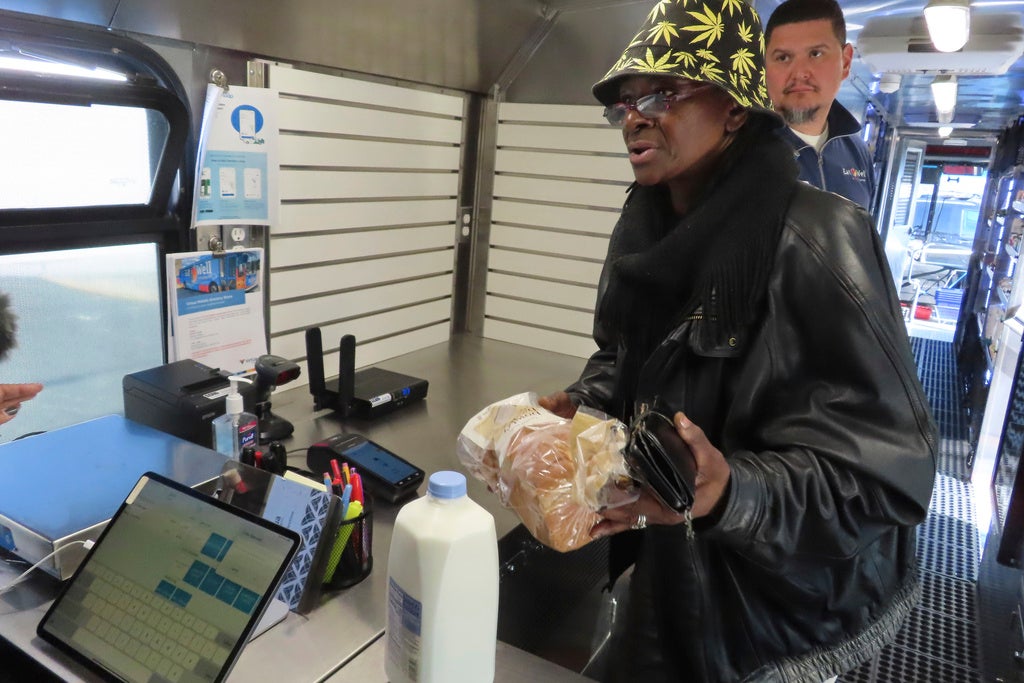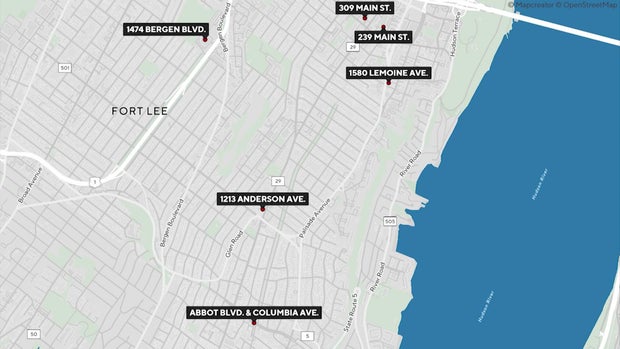New Jersey
With no supermarket for residents of Atlantic City, New Jersey and hospitals create mobile groceries

In this seaside resort, where $5 billion worth of in-person and online gambling gets done each year, there still is not a supermarket.
People who live in Atlantic City must either drive off the island to a mainland store, take public transportation — whose cost eats away at the amount left for food — or shop in pricey, poorly stocked corner stores in their own city.
A much-touted, heavily subsidized plan to build what would be the city’s first supermarket in nearly 20 years fell apart earlier this year. Now, the state and a hospital system are sending a converted school bus laden with fresh food available for purchase into the city as a temporary solution.
Virtua Health brought a modified transit bus to a poor neighborhood in Atlantic City on Friday as part of its “Eat Well” program, funded by the New Jersey Economic Development Authority.
The program aims to bring high quality food and fresh produce to economically deprived areas that lack meaningful access to healthy food. Atlantic City is second on the list of 50 New Jersey communities designed as “food deserts” due to lack of access to such food.
Delorese Butley-Whaley, 62, was delighted to board the bus to buy a half gallon of milk and a loaf of bread for a total of $3.
She usually walks 30 to 45 minutes to a local corner food store, straining her bad knees, or takes the bus there in bad weather. Sometimes she ventures to a full-fledged supermarket on the mainland in Absecon, a $10 cab ride in each direction. That quickly eats into her food budget.
“We don’t have a real supermarket here,” she said. “This is something we all need. I love this. It’s really convenient. I was able to get everything I needed for the rest of the week right here.”
Last week, in her first trip to the bus, she bought salmon.
“Salmon!” she said. “Imagine that!”
April Schetler, who runs the program for Virtua Health, said it is designed to fill part of the void in communities without a real supermarket like Atlantic City and Camden. All its food is sold at 30% to 50% below normal retail prices.
There is no income restriction on the program; anyone who shows up can shop, she said.
“We try to bake dignity into everything we do,” Schetler said. “By not asking for financial information, we’re providing a different experience.
“We come right to them, in their neighborhoods,” she said. “It can be a $25 cab ride just to get you and your groceries home.”
It wasn’t supposed to be this way in Atlantic City, where in Nov. 2021, Gov. Phil Murphy and top elected officials held a much-ballyhooed ground breaking ceremony for a new ShopRite supermarket that was to be built on vacant land not far from the casinos.
The state was willing to commit $19 million in public funds to see the project across the finish line. But construction never started and the project fell apart. The state said earlier this year it would seek new bids for another store.
A message seeking comment left with the developer, Village Super Market Inc., was not immediately returned Friday.
The Virtua food bus is one of two similar efforts paid for by the state with $5.5 million in funding. AtlanticCare, another southern New Jersey hospital system, is adding a mobile grocery to its food pantry program that also will include classes on health education, cooking classes and incentives to buy healthy foods.
“People come here to have fun, they go to the casinos,” said JoAnn Melton, 42, who also shops at a corner store she says is beset by loiterers and drunks from a nearby liquor store. “But what about those that actually live here? We’re just trying our best to live and raise a family.”
The grocery bus “is awesome,” she said. She bought dishwasher detergent, bleach, coffee, lemons, bananas and bread, all for $16. She often pays $5 for two sad-looking bananas at the corner store.
“We really need this,” she said. “This is good for us.”

New Jersey
Mail stolen from 6 USPS mailboxes across Fort Lee, N.J. Map shows where residents need to be wary

Police are investigating after mail was stolen from half a dozen United States Postal Service mailboxes in Fort Lee, New Jersey, over the weekend.
It comes amid recent reports of mail security issues across the Tri-State Area.
Fort Lee Police issue warning for residents who used blue mailboxes
Fort Lee Police say Sunday morning, a resident contacted the authorities after noticing a blue USPS mailbox was unsecured, open and empty.
“They did a little canvassing of some other mailboxes in the area, in the borough, and realized there was probably about a half dozen other mailboxes in the same situation, where the door was open and all the mail was removed,” Fort Lee Police Chief Matthew Hintze said.
Hintze said Fort Lee Police launched a joint investigation with USPS inspectors and discovered six mailboxes were targeted across Fort Lee. The boxes were located at:
- 1580 Lemoine Ave.
- 231 Main St.
- 309 Main St.
- 1213 Anderson Ave.
- 1475 Bergen Blvd.
- Abbott Boulevard/Columbia Avenue
Investigators believe the master key or locks on the mailboxes were somehow compromised. They also believe the thief or thieves were likely looking for personal information to commit fraud.
Police say anyone who dropped mail containing sensitive information in any of the impacted mailboxes after 3 p.m. on Sept. 20 should be on the lookout for suspicious activity.
“Please monitor all your financial accounts, check your bank accounts. If you really want to do due diligence, conduct a credit report, maybe a credit freeze,” Hintze said. “If you see anything suspicious or fraudulent, please come in to the Fort Lee Police Department and make that report.”
The investigation is ongoing.
Mail-related crime across New York and New Jersey
This is just the latest mail-related crime reported in the Tri-State Area in recent weeks.
Earlier this month, two Long Island business owners said they lost nearly $3,000 after someone apparently fished checks they had mailed out of a mailbox, washed off the ink, and rewrote the checks.
“I went to the post office to file a complaint, and they said this is an everyday occurrence. It’s constantly happening,” business owner Rich Miller said at the time.
They were later reimbursed, but they weren’t the only recent victims of check washing. Another Long Island resident said she lost $20,000 after three checks she wrote were stolen and cashed by a thief.
“What the Postal Police had showed me is that they literally took Wite-Out and they erased the payable to,” Jean Gioglio-Goehring said.
Experts advise paying bills electronically to avoid falling victim to crimes like these.
Police say another way to keep your mail safe is to bring it inside the post office instead of just dropping it one of the blue mailboxes, even if the boxes are right outside the building.
“The only way you’re going to be safe is to take the mail actually into the post office during business hours and then you know your mail is safe. Because if you deposit it in a mailbox after hours, then you’re certainly at risk,” Tenafly resident Neil Taylor said.
New Jersey
Watch: 2,358 people play catch to break world record in New Jersey – UPI.com

Sept. 23 (UPI) — The Yogi Berra Museum and Learning Center in New Jersey gathered 2,358 people to play catch and break a Guinness World Record.
The Sunday event at Yogi Berra Stadium in Little Falls officially broke the record for the largest game of catch, with 2,358 people splitting off into pairs to throw baseballs back and forth.
Guinness World Records adjudicator Michael Empric said there were very few disqualifications during the attempt.
“There were some phone violations, and also there was some rolling of the ball,” he told MLB.com. “When we say catch, we want people to play to the best of their ability. That does involve throwing the ball, not rolling it. There weren’t a lot of deductions, though. For a group this size, I think eight pairs were deducted, which was minimal.”
New Jersey
Can’t-miss 2025 girls soccer games across New Jersey this week, Sept. 15-21
The regular season is heating up and there is must-see action across the state of New Jersey. Check out the list below to see some of the best games to keep from Monday, Sept. 15, to Sunday, Sept. 21.
Monday, Sept. 15
If you purchase a product or register for an account through a link on our site, we may receive compensation. By using this site, you consent to our User Agreement and agree that your clicks, interactions, and personal information may be collected, recorded, and/or stored by us and social media and other third-party partners in accordance with our Privacy Policy.





















